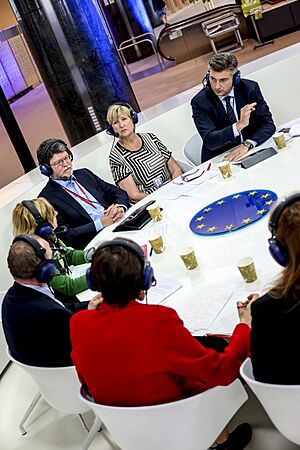Andrej Plenković facts for kids
Quick facts for kids
Andrej Plenković
|
|
|---|---|
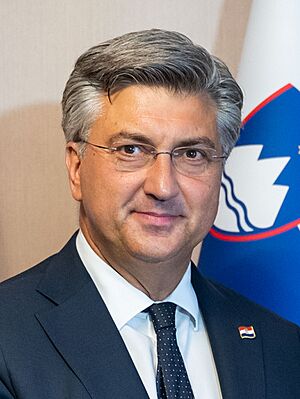
Plenković in 2024
|
|
| Prime Minister of Croatia | |
| Assumed office 19 October 2016 |
|
| President | Kolinda Grabar-Kitarović Zoran Milanović |
| Deputy | Davor Božinović (2019–) Tomo Medved (2020–) Oleg Butković (2022–) Ivan Anušić(2023–) Marko Primorac (2024–) David Vlajčić (2025–) See former
Ivan Kovačić (2016–2017)
Davor Ivo Stier (2016–2017) Damir Krstičević (2016–2020) Martina Dalić (2016–2018) Predrag Štromar (2017–2020) Marija Pejčinović Burić (2017–2019) Tomislav Tolušić (2018–2019) Zdravko Marić (2019–2022) Boris Milošević (2020–2022) Anja Šimpraga (2022–2024) Josip Dabro (2024–2025) |
| Preceded by | Tihomir Orešković |
| President of the Croatian Democratic Union | |
| Assumed office 17 July 2016 |
|
| Secretary-General | Gordan Jandroković Krunoslav Katičić |
| Preceded by | Tomislav Karamarko |
| Member of the European Parliament | |
| In office 1 July 2013 – 12 October 2016 |
|
| Constituency | Croatia |
| Member of Parliament | |
| In office 22 December 2011 – 28 September 2015 |
|
| Constituency | VII electoral district |
| Personal details | |
| Born | 8 April 1970 Zagreb, SR Croatia, Yugoslavia |
| Political party | Croatian Democratic Union (2011–present) |
| Spouse |
Ana Maslać
(m. 2014) |
| Children | 3 |
| Parents |
|
| Alma mater | University of Zagreb |
| Awards | |
Andrej Plenković was born on April 8, 1970. He is a Croatian politician. He has been the prime minister of Croatia since October 2016.
Before becoming prime minister, he was one of Croatia's representatives in the European Parliament. He served there from 2013 until he became prime minister. Plenković has also been the leader of the Croatian Democratic Union political party since 2016.
After finishing law school in 1993, Plenković worked in Croatia's Ministry of Foreign Affairs. He later became a diplomat. He was Croatia's deputy ambassador to France from 2005 to 2010. He then became a State Secretary for European Integration. In 2011, he was elected to the Croatian Parliament.
He became the leader of the HDZ party in 2016. He led his party to win the 2016 election. He was officially named prime minister on October 10, 2016. His government was approved by Parliament on October 19, 2016. He is one of only two Croatian prime ministers to serve more than one term. He won elections in 2016, 2020, and 2024. He is also the longest-serving prime minister in Croatia's history since it became independent.
Contents
Early Life and Education
Andrej Plenković was born in Zagreb on April 8, 1970. His father, Mario Plenković, was a university professor. His mother, Vjekoslava Raos, was a heart doctor. He went to elementary school and high school in Zagreb.
He studied law at the University of Zagreb starting in 1988. He graduated in 1993. His final paper was about how the European Community makes decisions. He was not required to join the army because he had a mild form of anemia.
Early Career and Diplomacy
Working as a Volunteer Translator
While at university, Plenković volunteered as a translator. He worked for the European Community in Croatia from 1991 to 1992. He was very interested in Europe during the early 1990s. He was active in the European Law Students Association (ELSA). He was the president of ELSA in Zagreb in 1991. He also became the first president of ELSA Croatia in 1992. Later, he was president of the international ELSA committee in Brussels.
As a student, he had internships in London and at the European Parliament. He also worked for the Croatian mission to the European Community from 1993 to 1994.
Becoming a Diplomat
Plenković completed a program to become a diplomat at the Ministry of Foreign Affairs. He passed his bar exam in 2002. He also earned a master's degree in International Public and Private Law in 2002. His master's paper was about the European Union's foreign and security policy.
Working for the Ministry of Foreign Affairs
From 1994 to 2002, Plenković held different jobs in the Ministry of Foreign Affairs. He was in charge of European integration. He also advised the minister on European affairs. He was part of the team that negotiated Croatia's agreement to join the European Union.
From 2002 to 2005, Plenković was a deputy chief for Croatia's mission to the European Union in Brussels. He helped coordinate political activities. He also worked to connect with officials from the European Commission, Council, and Parliament. He worked on Croatia's application to join the European Union in 2002. He also pushed for Croatia to become a candidate country in 2004.
From 2005 to 2010, Plenković was the deputy ambassador in France. He handled political and organizational matters there.
State Secretary for European Integration
Plenković became the State Secretary for European Integration. He played a big role in the campaign for Croatia to join the European Union. He gave many talks about joining the EU across Croatia. He also appeared in many media interviews.
As State Secretary, he was also a political director for EU affairs. He helped lead the Stabilisation and Association agreement between Croatia and the EU. He was also the national coordinator for the Danube Strategy of the European Union.
Political Career
Member of the Croatian Parliament
In 2011, after 17 years as a diplomat, Plenković joined the Croatian Democratic Union (HDZ) party. From December 2011 to July 2013, he was a member of the Croatian Parliament. He was elected from the 7th electoral district. He also served on committees related to foreign and European affairs.
Member of the European Parliament
From April 2012 to July 2013, Plenković was one of Croatia's observers in the European Parliament. He helped ensure Croatia's entry into the European Union. He also worked to get EU funds for Croatia.
In April 2013, he ran in the first Croatian elections for the European Parliament. He was elected and received many votes.
From 2013 to 2014, Plenković was part of the Committee on Budgets. From 2014, he was the vice-chairman of the European Parliament Committee on Foreign Affairs. He also led the Parliament's mission to observe the Ukrainian parliamentary election in 2014.
President of the Croatian Democratic Union
Plenković was elected president of the HDZ party on July 17, 2016. This showed the party was moving towards more moderate views. In the 2016 parliamentary election, he led his party to an unexpected win.
He was officially named prime minister-designate on October 10, 2016. He had the support of 91 members of Parliament, more than the 76 needed.
Prime Minister of Croatia
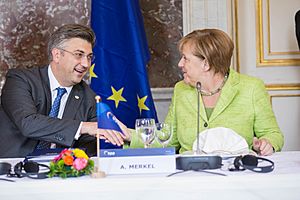
Plenković became the 12th prime minister of Croatia on October 19, 2016. His government was approved by 91 votes in Parliament. He said his government would focus on social dialogue, economic growth, and tax reform.
Changes in Government
On April 27, 2017, Plenković removed three ministers from his government. These ministers were from the Bridge of Independent Lists party. They did not support the finance minister, Zdravko Marić. The Bridge of Independent Lists then left the ruling coalition.
This left Plenković's government without a clear majority in Parliament. However, the government crisis ended on June 9, 2017. Five members of the Croatian People's Party (HNS) agreed to join a coalition with the HDZ. The government then changed some of its ministers.
Domestic Policies
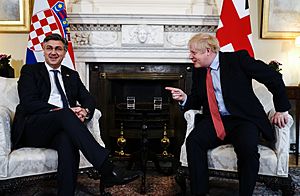
His government introduced an education reform in 2018. They also raised the renewable energy tariff in August 2017. This was to encourage more renewable energy production. In April 2018, the Croatian Parliament approved a convention to prevent violence against women.
In October 2018, the government proposed a pension reform. This would have changed the retirement age to 67. However, trade unions protested this plan. They collected many signatures for a referendum. The government then changed the retirement age back to 65.
A nationwide strike by teachers began on October 10, 2019. Teachers wanted higher wages. The strike lasted until December 2, when an agreement was reached for gradual wage increases.
Economy
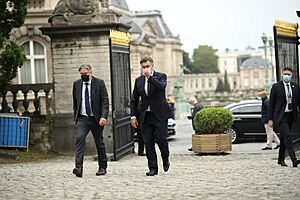
The government introduced a tax reform in January 2017. The main goal was to reduce the budget deficit. The reform included lowering corporate income tax. Personal income tax rates were also changed.
On October 30, 2017, Plenković announced that Croatia planned to join the Eurozone within seven to eight years. In December 2017, the government increased the minimum wage for 2018.
In 2017, Croatia's government had a surplus of €424.5 million. This was due to more tax income and less interest payments. The country's debt also decreased. However, many people continued to leave Croatia in 2017. Reports in 2018 noted that economic reforms had slowed down.
A pension reform was adopted in 2018. It changed the legal retirement age to 67 for all employees.
Foreign Policy
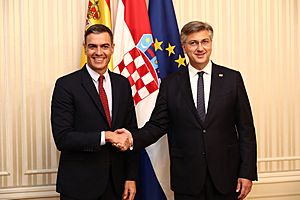
After his first European Council summit, Plenković said Croatia did not need to build border fences. His first official foreign visit was to Sarajevo, Bosnia and Herzegovina, on October 28, 2016. He said his government would support Bosnia and Herzegovina in joining the European Union.
In November 2016, he visited Ukraine. He met with Prime Minister Volodymyr Groysman. Plenković supported a peaceful return of areas in Ukraine controlled by pro-Russian groups.
On June 29, 2017, a court ruled on a border dispute between Slovenia and Croatia. The decision favored Slovenia. Slovenia wanted access to international waters. Croatia had left the arbitration process in 2015. Plenković called for direct talks to solve the issue.
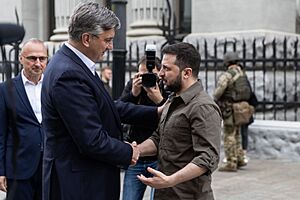
After a court verdict in a war crimes trial, Plenković said it showed "deep moral injustice" to Croats from Bosnia and Herzegovina. He later clarified that Croatia accepted the verdict. He also expressed "regrets and condolences" for all victims.
Plenković supported Dragan Čović in the 2018 election for the Croat member of the Presidency of Bosnia and Herzegovina. After Željko Komšić won, Plenković criticized the result. He said that members of one group were electing a representative for another group. Komšić responded that Croatia was undermining Bosnia and Herzegovina.
Plenković's government supported the Global Compact for Migration.
In 2019, Plenković helped lead negotiations for new leaders in the European Union. This included roles in the European Council, European Commission, and European Central Bank.
Political Views
People often describe Plenković's political views as pro-European and moderate. His election was seen as different from a trend of anti-European feelings in other parts of Europe. Some also describe his views as moderate conservative.
Plenković himself has said his policy is "without extremes and populism." He describes his political views as centre-right.
Personal Life
Plenković is married to a lawyer named Ana Maslać. They have three children: a son named Mario, a daughter named Mila, and another son named Ivan.
Besides his native Croatian, Plenković speaks English, French, and Italian very well. He can also speak some German.
He has lived in Slovenia and Zagreb, Croatia. He worked as a university professor at the University of Maribor. He also worked at Alma Mater Europaea – Evropski center, Maribor. There, he led a doctoral program in strategic communication.
Images for kids
See also
 In Spanish: Andrej Plenković para niños
In Spanish: Andrej Plenković para niños
 | Kyle Baker |
 | Joseph Yoakum |
 | Laura Wheeler Waring |
 | Henry Ossawa Tanner |


